October 9, 2024 · 10 min read
Achieving Project Milestones Faster with Smarter Meeting Agendas

Shaimaa Badawi
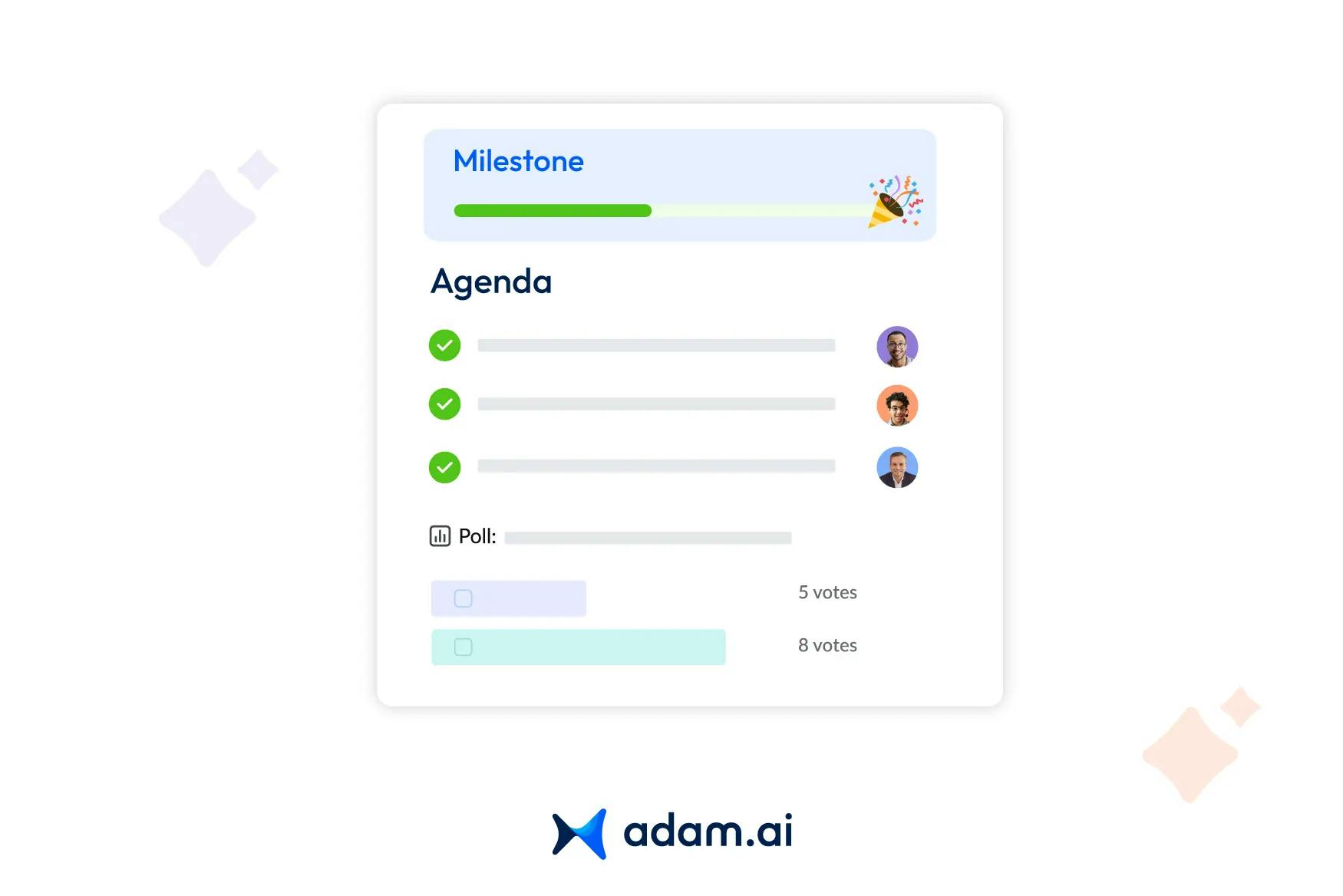
Achieving project milestones can be challenging, especially when meetings lose focus or wander off-topic. But what if your meetings could go beyond routine updates?
Picture a refined approach where every agenda item is purposefully designed to drive progress, build accountability, and keep the team sharply aligned with each milestone. Discover how smart agendas can be the key to reaching milestones more efficiently and effectively.
Why are project milestones crucial to successful project management?
Project milestones play a pivotal role in the success of project management by serving as structured checkpoints that enable both project managers and stakeholders to gauge progress, ensure alignment, and drive accountability. Here’s how:
1. Progress tracking
Milestones act as clear, measurable markers that help teams monitor their progress against the project’s timeline, making it easy to identify if the project is on schedule or if adjustments are necessary. By assessing milestones, project managers can proactively address delays and maintain momentum.
2. Improved decision making
Each milestone offers an opportunity to make informed decisions about resource allocation, priorities, and timelines. When milestones are missed or achieved, it prompts managers to re-evaluate the project's trajectory and make adjustments to stay aligned with overarching goals.
3. Stakeholder alignment
Milestones provide a framework for transparent communication with stakeholders, offering them a high-level overview of the project’s status. This visibility not only keeps stakeholders informed but also helps in securing buy-in and managing expectations throughout the project lifecycle.
4. Enhanced accountability
By defining clear milestones, project teams are held accountable to specific goals within a set timeframe, ensuring that every phase of the project receives the necessary attention. This structure fosters a culture of responsibility, as team members are clear about their roles and the impact of their contributions.
5. Risk management
With milestones in place, potential risks or issues can be detected early, allowing teams to address them before they escalate. Milestones help in identifying dependencies and bottlenecks, enabling managers to take corrective actions that protect the project from potential setbacks.
6. Motivation and team morale
Achieving milestones can boost team morale, providing a sense of accomplishment and motivating team members to keep pushing forward. Celebrating these small wins along the project journey helps in maintaining a positive and productive team environment.
How do smart meeting agendas accelerate the achievement of project milestones?
Smart meeting agendas are powerful tools that streamline the path to achieving project milestones by keeping meetings focused, actionable, and aligned with project goals. Here’s how they accelerate milestone achievement:
1. Enhanced focus on key objectives
Smart agendas prioritize discussion topics that are directly tied to project milestones. By focusing the agenda on critical tasks, decisions, and next steps needed to advance each phase, teams avoid unnecessary diversions and concentrate on moving the project forward.
2. Efficient time management
With a structured agenda that includes time allocations for each topic, meetings are more productive and less likely to run over. This efficiency keeps team members on task, minimizes distractions, and ensures that important milestone-related discussions are given ample time without lingering on unrelated topics.
3. Clear action items and accountability
A smart agenda doesn’t just outline topics but specifies actionable items and assigns ownership. When team members leave a meeting with well-defined responsibilities, they are better equipped to work toward milestones with a clear sense of accountability. This clarity speeds up task execution and aligns everyone’s efforts with the project’s timeline.
4. Proactive problem-solving
Including checkpoints in the agenda for identifying potential blockers allows teams to address issues before they impact the timeline. This proactive approach to problem-solving ensures that roadblocks are addressed early, helping the team maintain momentum toward achieving milestones without unexpected delays.
5. AI-assisted insights and recommendations
Leveraging AI to create and refine meeting agendas introduces insights based on past meetings, project history, and data patterns. AI can suggest agenda items that anticipate project needs, reducing the risk of overlooking important discussions. AI-assisted agendas ensure that the team is consistently addressing the right issues to stay on track for milestones.
6. Alignment and cohesion among team members
A well-organized agenda fosters alignment by ensuring that all attendees are aware of the meeting’s objectives and their roles. When everyone is aligned on the priorities and outcomes, there is less chance of miscommunication, allowing the team to work cohesively toward milestone completion.
What role does AI play in creating effective meeting agendas for project milestones?
AI enhances the effectiveness of meeting agendas for achieving project milestones by bringing precision, personalization, and proactive insights to the agenda creation process. Here’s how AI plays a transformative role:
1. Data-driven agenda structuring
AI analyzes data from previous meetings, task completion rates, and project timelines to generate agenda topics that align with current project needs. By identifying patterns and recurring issues, AI can help structure agendas that focus on the most pressing topics related to milestones, ensuring meetings stay relevant and goal-oriented.
2. Personalization for participant relevance
AI can tailor agendas based on participants’ roles, project responsibilities, and previous contributions. This ensures that each attendee has a targeted role in the discussion, improving engagement and reducing unnecessary attendance. Customized agendas mean team members are only present for discussions relevant to their work, maximizing efficiency and contribution toward milestones.
3. Real-time adaptation and insights
AI-powered agenda tools can adapt in real-time, integrating updates from the project management system and flagging new action items or potential roadblocks. This adaptability means that meeting agendas reflect the latest project status, allowing teams to address issues proactively before they delay milestones.
4. Prioritization of action items and deadlines
By analyzing the importance and urgency of pending tasks, AI can prioritize agenda items that are critical to milestone progress. It highlights the most time-sensitive and impactful issues, helping teams focus on what’s needed to stay on schedule and meet milestone targets.
5. Automated follow-up and accountability
AI can automatically track action items assigned in previous meetings and include updates in the next agenda. This creates a continuous cycle of accountability, where previous commitments are revisited, and progress is assessed, keeping everyone aligned with the project’s milestone goals.
6. Time optimization and scheduling
AI can suggest optimal meeting lengths and times based on the complexity of agenda items, ensuring that no time is wasted and that discussions are efficiently managed. By determining the ideal time needed for each topic, AI helps avoid drawn-out meetings, keeping discussions focused on milestone-related outcomes.
7. Enhanced decision-making with predictive analysis
Leveraging predictive analytics, AI can anticipate potential bottlenecks and suggest agenda items focused on problem-solving for future issues. This foresight allows teams to make proactive decisions that keep the project trajectory aligned with milestone deadlines.
What key topics should your agenda cover to drive milestone progress?
To create a meeting agenda that effectively drives milestone progress, focus on covering key topics that align directly with the project’s goals, address current challenges, and assign clear next steps. Here’s a breakdown of critical topics to include the following:
1. Milestone-specific updates and progress review
Start with a brief overview of where the project stands in relation to its milestones. Discuss completed tasks and what remains, so the team understands progress and any potential delays in meeting upcoming deadlines. This keeps everyone aligned on the broader goal.
2. Current blockers and risk mitigation
Identify any challenges or risks that could impede milestone progress. Discuss possible solutions and actions to prevent these issues from causing delays. By addressing blockers early, you keep the project on track and avoid bottlenecks that could impact future milestones.
3. Resource allocation and requirements
Review the resources currently allocated and determine if additional support is needed to stay on schedule. This could include additional team members, tools, or budget adjustments. Proper resource planning is essential to ensure the team can meet milestones without disruptions.
4. Stakeholder and client feedback
If there’s recent input from stakeholders or clients, include it in the agenda to keep the team informed of expectations and align deliverables with feedback. This helps prevent rework and ensures that the project progresses in a direction that meets stakeholder requirements.
5. Action items with clear ownership and deadlines
Each agenda item should lead to specific action items assigned to team members, complete with deadlines. This reinforces accountability, as team members leave the meeting knowing their responsibilities and timelines, making it easier to track progress toward the next milestone.
6. Future milestones and upcoming deliverables
Conclude by outlining the next set of milestones and the key deliverables expected. This provides a forward-looking focus, keeping the team motivated and aligned on the next phases of the project.
How do you assign accountability for milestone-critical tasks?
Assigning accountability for tasks crucial to achieving project milestones is key to ensuring smooth project progress and meeting deadlines. Here’s a structured approach to make accountability clear and actionable:
1. Define each task’s objective and impact
Begin by clearly defining each milestone-critical task, outlining its purpose, expected outcome, and its impact on the overall project timeline. This clarity helps team members understand the significance of their responsibilities and fosters commitment to meeting milestone deadlines.
2. Assign a specific owner to each task
Designate a single person responsible for each task rather than assigning it to multiple team members. A specific owner creates clear accountability, reducing ambiguity about who is in charge of completing the task and who will report on its status.
3. Set measurable goals and deadlines
Ensure that every task has a measurable objective and a deadline tied to the project’s milestone. Break down larger tasks into smaller, manageable steps, if necessary, with each step linked to the milestone timeline. This structure makes it easy to track progress and see how each step contributes to reaching the milestone.
4. Use a tracking system for transparency
Utilize project management tools to track task progress and provide visibility to the entire team. Keeping tasks visible and status updates centralized ensures accountability and gives the team an easy way to check progress on key tasks.
5. Conduct regular check-ins and reviews
Schedule periodic check-ins to review the status of each task and address any challenges. These check-ins reinforce accountability by keeping everyone engaged and addressing potential issues early, which helps prevent delays.
6. Acknowledge progress and address setbacks
Recognize team members who are consistently meeting or exceeding their responsibilities. For any setbacks, discuss ways to overcome obstacles constructively. Providing support, such as additional resources or guidance, shows commitment to task completion while encouraging accountability.
7. Follow-up on action items in each meeting
End each meeting with a brief review of action items and assigned tasks, reinforcing accountability. Ensure that each task owner understands their next steps and upcoming deadlines, helping everyone stay aligned on milestone goals.
How does adam.ai’s smart agenda feature improve milestone tracking and accountability?
adam.ai's smart agenda feature enhances milestone tracking and accountability through several key functionalities:
- Structured agenda creation: The platform enables users to craft detailed agendas that align with project milestones. By setting clear objectives and discussion points, meetings become more focused, ensuring that all topics are pertinent to advancing project goals.
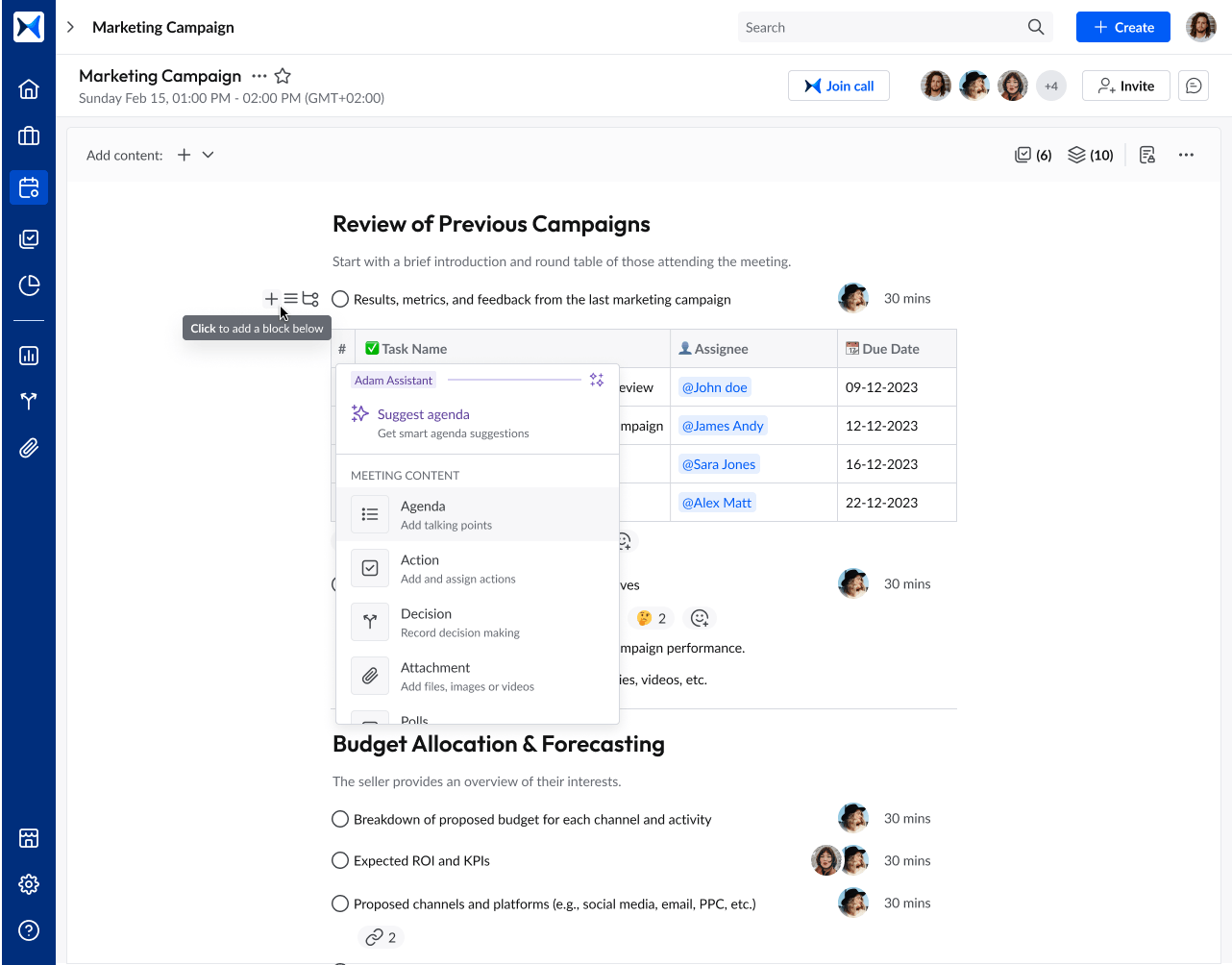
- Real-time collaboration: adam.ai facilitates real-time collaboration by allowing team members to annotate documents, share insights, and engage in discussions directly within the meeting interface. This interactive environment promotes active participation and ensures that all stakeholders are aligned on milestone objectives.
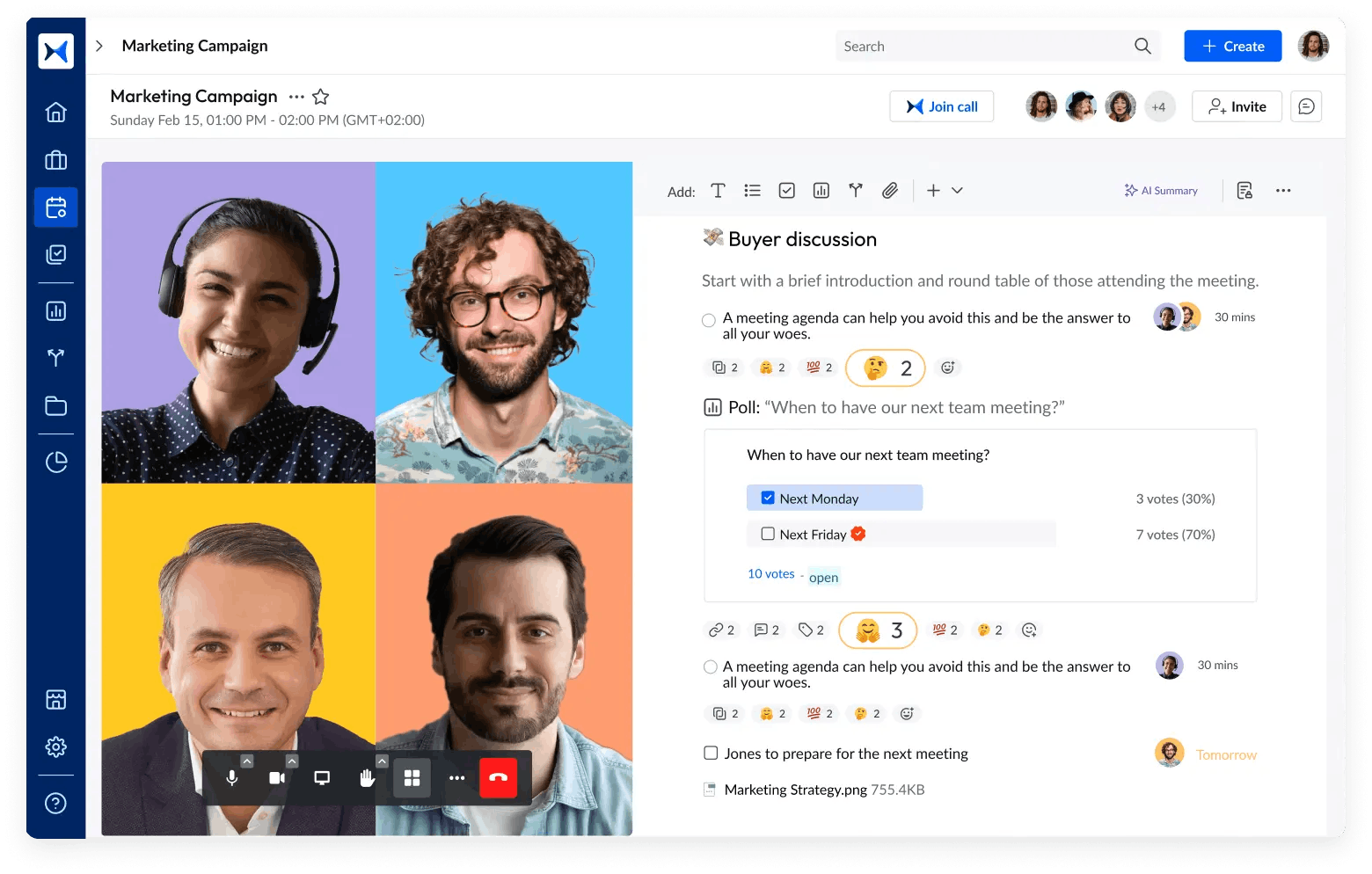
- Action item assignment and tracking: During meetings, the smart agenda feature allows for the assignment of specific tasks to team members, complete with deadlines and priority levels. These action items are tracked within the platform, providing visibility into task progress and ensuring accountability for milestone-related responsibilities.
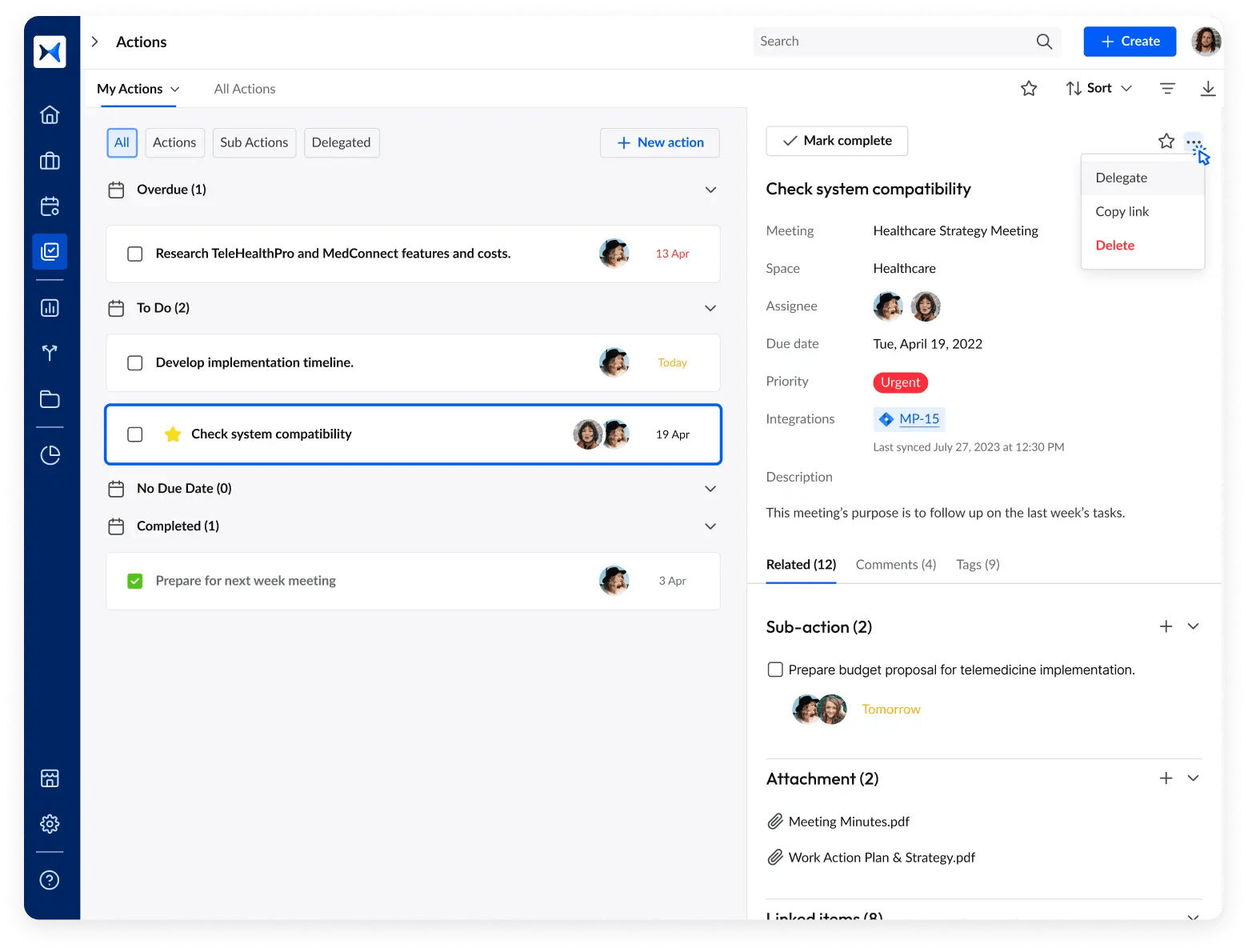
- Integration with project management tools: adam.ai integrates seamlessly with various project management applications, enabling the synchronization of action items and milestones across platforms. This integration ensures that all project data is up-to-date and accessible, facilitating effective milestone tracking and accountability.
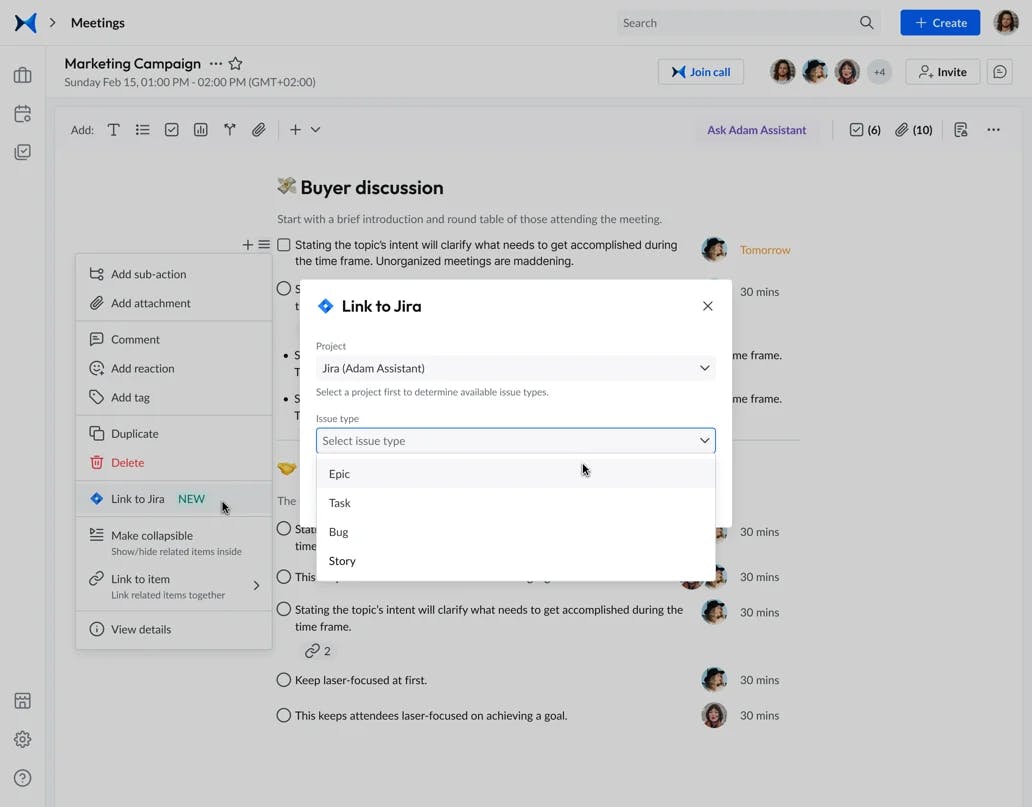
- Automated follow-ups and agenda management: The platform keeps meetings on track by notifying participants when discussions stray from the agenda. It also automates reminders for deadlines and tasks, ensuring accountability and helping teams meet milestones efficiently.
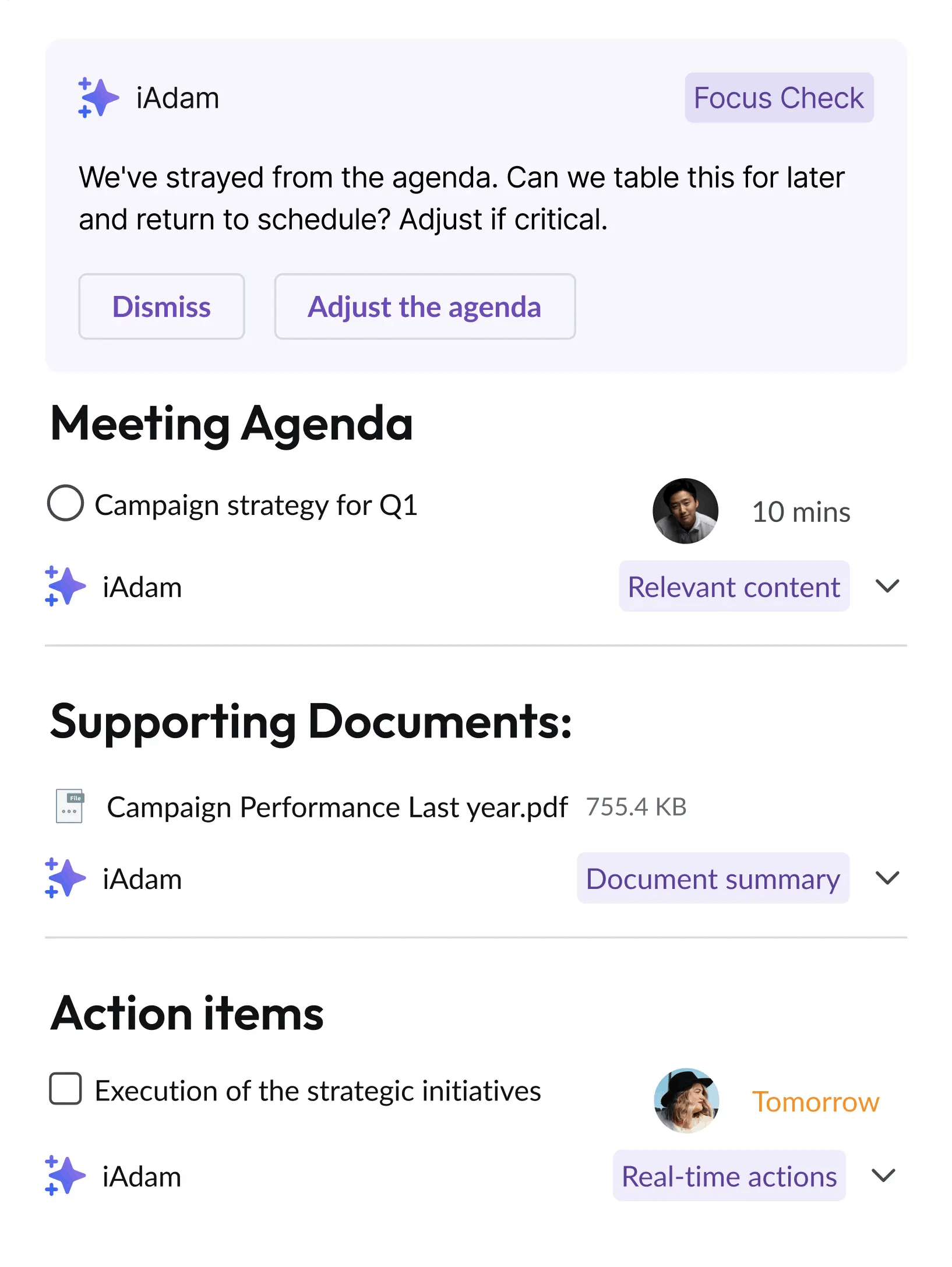
Transform how you conduct critical meetings—From meticulous preparation to effective execution and insightful follow-up, adam.ai integrates comprehensive analytics, full customization, and intuitive interfaces with powerful meeting management tools.
Easy onboarding. Enterprise-grade security. 24/7 dedicated support.
The bottom line
Smart meeting agendas are a powerful tool in driving project milestone achievement. As projects grow more complex, having the right technology to streamline communication and accountability is essential.
And while there may be multiple solutions available, here is why adam.ai is the meeting management software platform you can trust:
- adam.ai is one of Atlassian Ventures' portfolio companies.
- In the meeting management software category on G2, adam.ai has been ranked a leader and a high performer for successive quarters in the past years.
- adam.ai has been included in the Forrester Report in the AI-enabled meeting technology landscape.
- adam.ai is trusted and used by powerful teams and organizations worldwide for all types of critical meetings, like board, committee, project management, and business development meetings.
- And most importantly, adam.ai integrates with your existing workflow, is SOC2 compliant, provides dedicated support and success, and has a free trial option.
Subscribe to adam.ai blog
Stay ahead with the latest insights—get our newest blog posts, tips, and updates sent straight to your inbox.